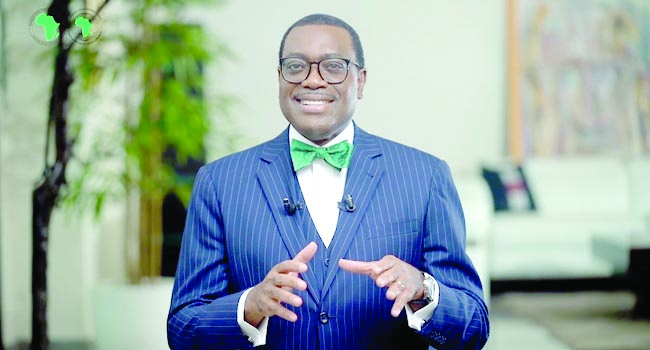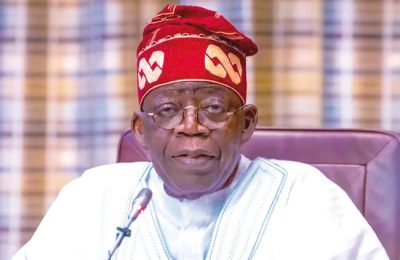The President of the African Development Bank (AFDB) Group, Dr. Akinwumi Adesina, offered useful suggestions on how Nigeria’s economy can be rejuvenated, if well implemented, at the 90th birthday celebration of one of Nigeria’s statesmen, and former Head of State, General Yakubu Gowon (rtd), writes JOSEPH INOKOTONG.
The occasion was not an economic summit, but his continuous quest for economic prosperity of Nigeria, and indeed Africa, influenced a tilt of his keynote address to developmental issues. The views he canvassed, supported with elaborate examples can turn around the economic fortunes of Nigeria if the implementation is properly structured, and in sequence.
The President of African Development Bank (AfDB), Dr. Akinwumi Adesina in a keynote lecture he delivered titled “Building a Global Nigeria” on the occasion of the 90th Birthday of Yakubu Gowon (retd) former Head of State & Commander in Chief of the Armed Forces of the Federal Republic of Nigeria delved into how a “Global Nigeria will turn “Japa” into Japada; insisting that a “global Nigeria must be a food secure Nigeria, must be competitive globally, must invest heavily in education, must have globally competitive quality infrastructure, must achieve universal access to electricity, must be an industrialised Nigeria, must move into high valued manufacturing, must deliver a talent dividend, and must achieve universal access to electricity”.

Any nation seeking to industrialise must be able to generate enough electricity to power the industries. Dr. Adesina acknowledged in his lecture that today, the major challenge facing Nigeria’s manufacturing is the very high cost and unreliability of electricity supply, load shedding and the inconsistent availability of electrical power which have resulted in high and uncompetitive manufacturing costs.
Most Nigerian manufacturing companies, he noted, self-provide their own energy, with a high dependence on generators, diesel and heavy fuel oil. Their emissions’ contributions make them brown industries, not green industries. It has been estimated by the International Monetary Fund (IMF) that Nigeria loses about $29 billion annually, that is, 5.8 percent of its Gross Domestic Product (GDP), due to a lack of reliable power supply. The report also indicates that Nigerians spend $14 billion per year on generators and fuel. The AfDB President added, “There is no other way to say it. The lack of electricity is killing Nigerian industries.” According to the Manufacturers Association of Nigeria (MAN), industries spent N93.1 billion on alternative energy in 2018, and today, Dr. Adesina said, “No business can survive in Nigeria without generators. Consequently, the abnormal has become normal. Nigeria has gas and crude oil in abundance. Yet, 86 million people live daily without electricity. Today, Nigeria is the number one country in the world in terms of the total number of people without electricity.”
The AfDB, in its effort to support Nigeria and other African countries, invests massively in the continent’s power sector. To support the implementation of Nigeria’s Power Sector Recovery Programme, the Bank provided $200 million for the Nigeria Electrification Project, which is designed to fill the country’s electricity access gap. “We have also invested $210 million in the Nigeria Transmission project, to strengthen the grid power evacuation and regional interconnection. A major component of the African Development Bank’s energy strategy was the launch of the Desert to Power initiative, a $20 billion initiative to provide electricity for 250 million people across 11 countries of the Sahel, including Northern Nigeria. It is expected that Desert to Power will create the world’s largest solar zone. This initiative will draw lessons from successful projects already financed by the Bank, including the Noor Ouarzazate solar PV power project in Morocco, and the Ben Ban solar project in Egypt,” he stated.
Dr. Adesina added, “To support the efforts of African countries to achieve universal access to electricity, the President of the World Bank Group, Ajay Banga and I made the decision that the African Development Bank and the World Bank Group will work together to connect 300 million Africans, including Nigerians, to electricity by 2030 – the Mission 300.”

On his views about an industrialized Nigeria, the AfDB President noted that for decades, the share of manufacturing in Nigeria’s GDP has hovered around seven percent, as the nation has not been able to extricate itself from a comatose industrial manufacturing sector that is yet to unleash the fullness of its innovative potential. This, he said, is in sharp contrast to the dynamic and rapid performance of manufacturing in Asian countries, such as Singapore, Malaysia and China.
Giving examples, he said while Asian countries have focused on the export of manufactured products, Nigeria’s approach has been on import substitution. The manufacturing sector of Nigeria represents only three percent of total revenues from exports, but accounts for 50 percent of imports in the country. “Instead of being forward looking in expanding the share of manufactured goods in its total export revenue, Nigeria focuses on the model of import substitution.
“Import substitution, while important, is a very restrictive vision. It looks towards survival, instead of looking to create wealth through greater export markets and value diversification. The result is a manufacturing sector that cannot develop nor compete globally, but limits itself to “survival mode, and not a “global manufacturing growth mode.”
According to him, Nigeria must have greater ambitions for its manufacturing sector, by integrating and rapidly moving up global and regional value chains in areas of comparative advantage; by driving greater specialization and competitiveness; and by heavily investing in skills upgrades and human capacity development. The bottom line is that a well-developed and policy-enabled manufacturing sector, with an export orientation, will spur greater innovation, develop our export market potential, and structurally transform the economy. “Instead of being consumed with the conservation of foreign exchange, the focus should shift to expanding foreign exchange through enhanced export value diversification,” he advised.
Dr. Adesina observed that Nigeria is losing out on the global drive for competitiveness, in a world that is rapidly being changed via education, digital skills acquisition, and innovations, across all sectors. The Global Competitiveness Index Rankings for 2022 showed that Nigeria was ranked 114 out of 140 countries globally; and worse, Nigeria ranked well below several other African countries, including South Africa, Seychelles, Botswana and Namibia in Southern Africa; below Senegal and Ghana in West Africa; below Kenya, Rwanda and Uganda in East Africa; and below Morocco, Algeria and Tunisia in North Africa
On globally competitive quality infrastructure, he noted that after years of growth, post-independence, industrial development in Nigeria is today constrained by an extremely poor state of transport, ports, and logistics infrastructure. Estimates suggest that it costs $35,000 to export 100 tons of produce from Nigeria compared to just $4,000 from Ghana. About 90 percent of passenger and freight movements in Nigeria rely on roads, of which only 18 percent are paved.
“Meanwhile, our seaports are gridlocked. Recently the Financial Times reported that congestion at the port in Lagos has become so bad that it could cost more than $4,000 to truck a container 20 kilometers inland – almost as much as it costs to ship the very same container 12,000 nautical miles from China.”
He urged Nigeria to learn from Morocco, where the AFDB supported the development of its Tangier-Med port. The port is unique. It is an industrial port complex and platform with over 1,100 companies operating from within it. They collectively exported over € 8 billion worth of goods in 2020. It is home to several global companies, including Bosch, Daimler, Huawei, Siemens, and several others. Local companies located at the Tangier-Med, have also allowed Morocco to move up several global value chains, including automobiles, automotive parts, aeronautics, agriculture, food manufacturing, textiles, and logistics. Annually, over 460,000 cars are manufactured in the zone for exports, and more interesting, is that the bulk of workers and employees at the port complex are Moroccans.
Dr. Adesina recalled, “I took a walk at the Tangier-Med Port. I saw a well-synchronized maze moving with incredible efficiency. There were no kilometer-long lines of trucks waiting to get into and out of the port. The takeaway from Morocco’s Tangier-Med port is simply this: Nigeria must move away from the usual Gestapo-like approaches of raiding ports, or deploying soldiers to decongest ports, or having to control vehicular traffic at the ports. There are more sophisticated and efficient ways of doing so.
With a view to creating a global Nigeria, he charged the nation to focus not on decongesting ports but on transforming ports. “This must start with cleaning up administrative bottlenecks, most of which are unnecessary with multiple government agencies at the ports, high transaction costs and even blatant extortion, from illegal taxes and “contributions,” that never go into government coffers”.
Dr. Adesina frowned at the extremely high levels of poverty in the country that have fueled criminality, banditry, kidnappings, and armed robbery. A recent survey of the crime economy in Nigeria shows that the Northwest, Northeast and North Central have been devastated, with kidnappings becoming a default economy. “From schools to farms, markets, towns, villages and communities, the level of suffering, helplessness and abandonment are gutting out hope, and drowning communities and people in despair as economic activities plummet. Consequently, the criminal economy is upending the real economy of Nigeria”.
He called for a poverty-free Nigeria, stressing that to address the situation, urgent and comprehensive efforts are needed to restore security, and law and order, to protect lives, property, farmlands and to restore normalcy to traumatized zones, towns, villages, and communities, emphasizing, “To stabilize and restore economic fortunes, education, health, social protection, jobs for youth programmes must be prioritized. Simultaneously, we must decisively tackle and reduce the burgeoning numbers of out-of-school children.”
He said the current high level of food insecurity and hunger deserves decisive actions. In the first quarter of 2024, Nigeria’s food import bill hit a five-year high, at N1.5 trillion. Nigeria’s food import bill topped N7.8 trillion in the past six years alone. Securing Nigeria’s food supplies requires accelerating local food production, providing farmers with high-yielding seeds, the accessibility and affordability of fertilizers, mechanization, and the rapid expansion of irrigation, given the challenges of climate change.
“To ensure food security, the Federal Government in conjunction with State Governments, should return to the highly successful Growth Enhancement Scheme and the electronic wallet scheme that was put in place when I was Minister of Agriculture. Both initiatives delivered high-quality seeds and fertilizers to over 15 million farmers, which made food available at relatively low costs across Nigeria.
“For purposes of implementation, transparency, and accelerated impact, the Growth Enhancement Scheme and the E-wallet system should be protected by legislation. To help unleash the potential of the food and agriculture sector, the African Development Bank and its partners are investing over $814 million in the development of Special Agro-Industrial Processing Zones (SAPZs) in 8 States of the Federation,” these, he noted, will help Nigeria to process and add value to its agricultural commodities and establish critically needed platforms for becoming competitive in global agricultural value chains. He highlighted that decisive and sustained efforts are needed to end insecurity, especially to save vast areas of the food belt of Nigeria in the northwest, northeast and middle belt. The deployment of digital surveillance tools, drones, artificial intelligence, and satellite imagery needs to be increasingly used to track and provide intelligence. The development and deployment of farm protection guards and safe food transport corridors are worth developing.
Dr. Adesina said, “While Nigeria’s export basket has hardly changed, Malaysia and Vietnam have used aggressive horizontal and vertical industrial manufacturing diversification to move from low-value products to high-value market products. The result is self-evident in the comparative wealth of the three countries. While export value per capita is $7,100 for Malaysia and $3,600 for Vietnam, it is only $160 for Nigeria.”
He noted that while Malaysia and Vietnam have moved on to “global manufacturing growth,” and creating massive wealth and jobs for themselves, Nigeria remains in a “survival” mode, still unable to substitute the imports of its petroleum products, while being one of the largest exporters of crude oil.
Nigeria had good policies, templates and programmes for industrialization and expanding industrial manufacturing for decades. He advocated for the need to close the huge gap between policy ideas and implementation.
READ ALSO: Bode George to Sanwo-Olu: Regulate street trading, don’t treat traders like criminals







